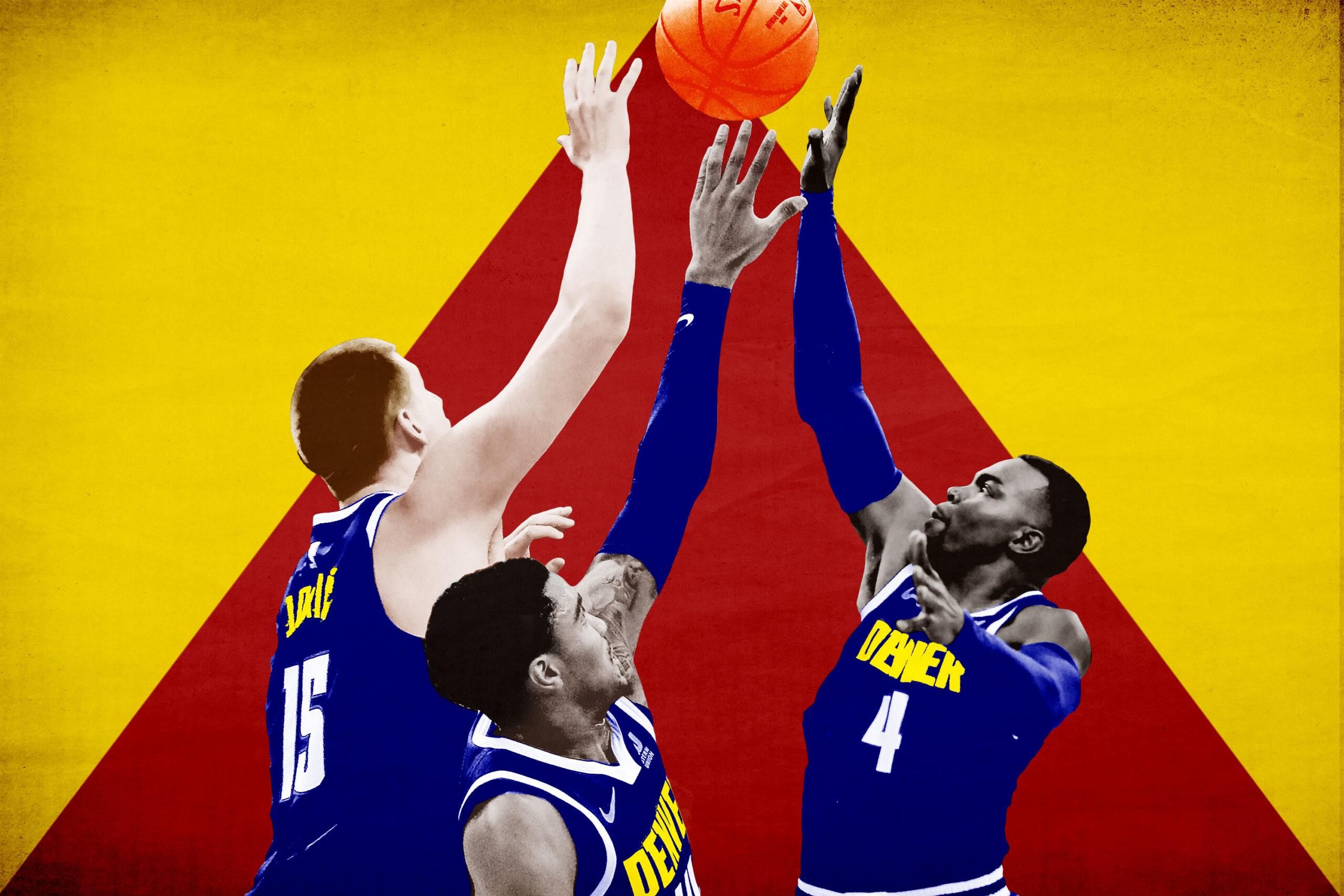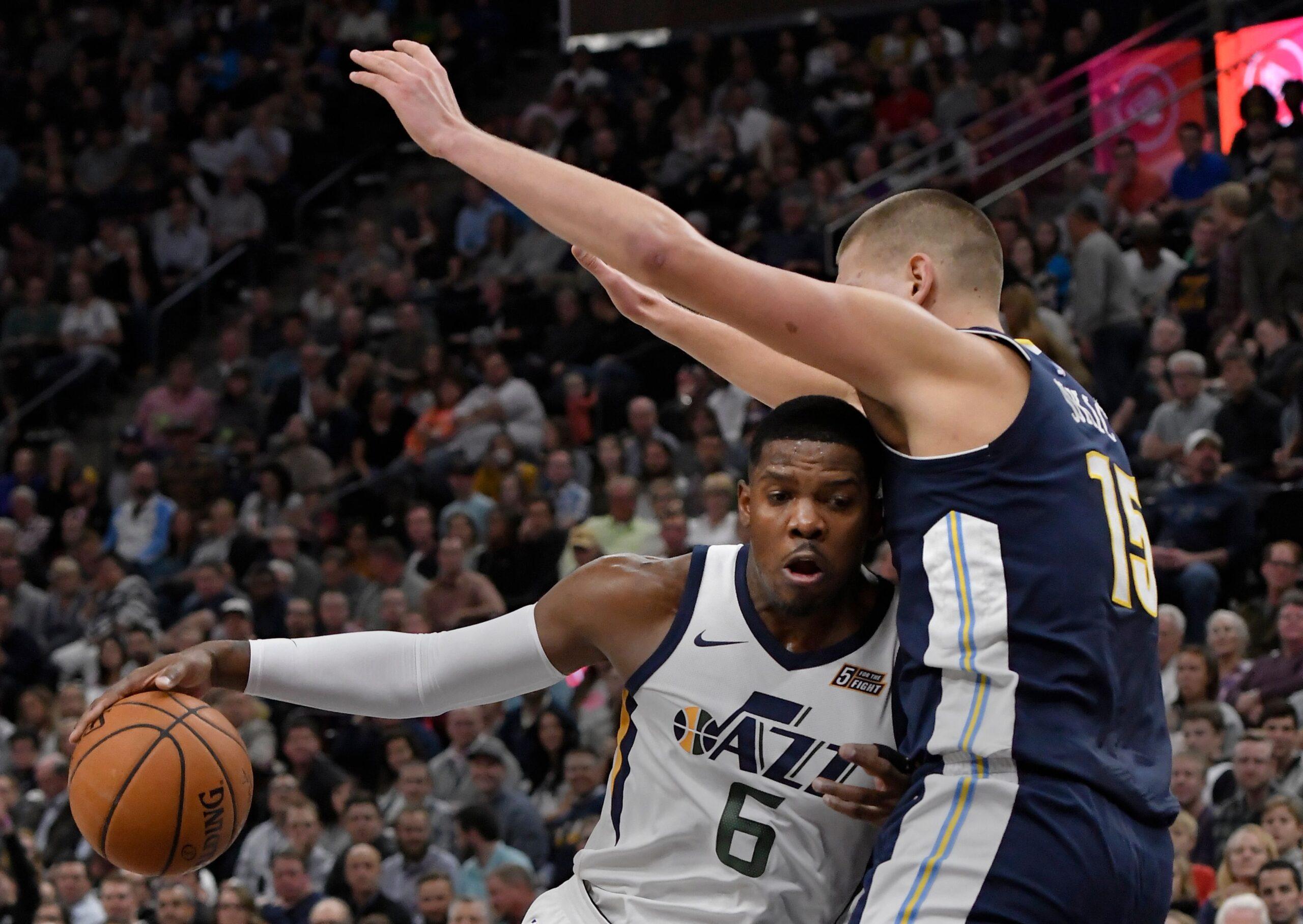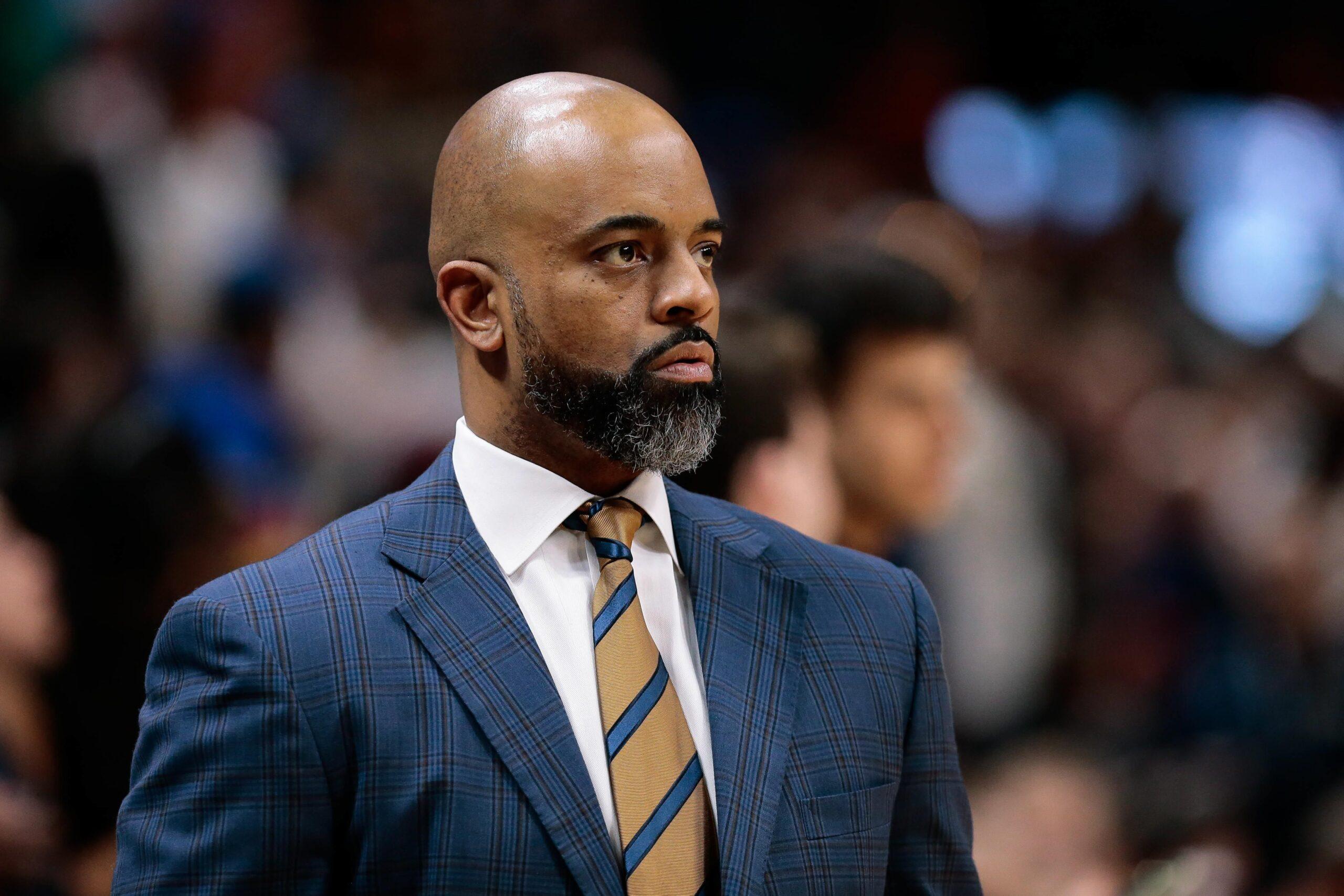
One of Wes Unseld Jr.’s goals this season is to yell less. In the heat of game action, though, the Denver Nuggets assistant coach in charge of the team’s defense can’t help himself. With a notebook on his lap and his eyes on the court, Unseld watches intently as a standard defensive possession unfolds. Nikola Jokic is defending a Lance Stephenson–JaVale McGee pick-and-roll in the fourth quarter of a close game against the Lakers. He cups his hand over his mouth and yells out instructions.
Both Jokic and guard Jamal Murray jump out to contain Stephenson, who goes left and dusts Murray. Jokic tries to get back and cover a wide-open McGee, but instead gets turned around and pushed into the restricted area flat-footed. Gary Harris collapses into the paint for a quick second to help cover McGee, but returns to his man outside the 3-point line almost immediately. The Nuggets find themselves in disarray during the possession, and it costs them. Stephenson scores over Jokic with ease. On the bench, Unseld folds his hands together in disappointment. There’s nothing left to yell.
For Unseld, the play was a painful resurfacing of last season’s Nuggets defense. Teams attacked Jokic downhill in pick-and-rolls, turned him into a traffic cone, and took advantage of his lack of athleticism and rim protection while putting pressure on their weak-side defenders, like Harris. It was one of the main reasons they finished with a bottom-10 defense in the league and missed the playoffs by a game. So, when Denver’s coaching staff reconvened during the offseason to assess their own performance and upcoming goals, their top priority was clear.

Like everything with the Nuggets, their defensive improvement had to start with their franchise player. So, Unseld and the staff asked Jokic where he felt he wanted to be on defense. “Up,” Jokic told them. Last season, the Nuggets had Jokic dropping back on pick-and-rolls in an effort to concede inefficient midrange shots. It didn’t work. They needed to try something different, so they complied with Jokic’s wish and had him move up. Unseld shies away from calling what Jokic does “hedging” the pick-and-roll. He prefers describing it as staying “level,” forcing the ball handler to make an earlier decision on the move. The tweak puts more pressure on the players behind Jokic. It requires more movement as well as constant communication.
“Theoretically, we should give up more 3s, and that’s where the multiple effort and the scramble mentality comes in,” Unseld told me. It’s less than an hour before the October 25 game against the Lakers tips off, and he is sitting courtside, sweating after working out various players, including Jokic. “We’re going to give up more 3s, but they need to be contested 3s, 3s under duress.”
Through eight games, the Nuggets have the fourth-best defense in the NBA and have the fifth-highest opponent turnover percentage.Their offense hasn’t been as explosive as it was the past two seasons; it’s been their defense that has helped them to a 7-1 start. But the team understands that the early numbers don’t mean nearly as much as the process that has gone into reshaping its schemes. They might not actually be a top-five defense, but their goal is to be good enough.“We’re not asking [the team] to be a top-10 defense. In a perfect world, we are, and if we get there, great. But we can’t be 28th, 29th in the league,” Unseld said. “With our offense, if we get to be average on defense, we’re beyond a 50-plus-win team.”
Before the Nuggets could get better at defense, they first had to get better at communicating. And before they could get comfortable shouting out assignments and coverages in games, they first had to make their training-camp practices quiet. The abrupt silence would occur during the team’s defensive drills. Players looked toward the bench in confusion, waiting for instruction.
“It was funny the first time they did it, because they didn’t tell us anything,” Mason Plumlee said. But the Nuggets coaching staff remained mum. Not a word was uttered. The players soon got the point. It became known as “the quiet drill,” according to Plumlee. From then on, whenever they weren’t communicating in practice, coaches would make them go through drills again even if they had run the coverage to perfection. Unseld and the rest of the staff wanted to hear them talk through every possession.
“It sounds very simple, but I think it helps,” Unseld said. “Just like we talk about muscle memory on the physical side, it’s the same thing with the aspect of communicating, making that a habit.”
The coaching staff’s emphasis on communication was a way to prepare for challenges both unforeseen and expected: Things will break down, and by putting Jokic higher up the court, both he and the players surrounding him needed to be ready to call out coverages and make adjustments on the fly. “I would say we have more guys talking this year,” Plumlee said. “And now if we get guys listening too, even better. Talking is one part of it, but communication takes two.”
We’re not asking [the team] to be a top-10 defense. In a perfect world, we are, and if we get there, great. But we can’t be 28th, 29th in the league. With our offense, if we get to be average on defense, we’re beyond a 50-plus-win team.Wes Unseld Jr., Denver Nuggets assistant coach
The Nuggets also needed to make adjustments to the way they rebounded. Denver finished top-three in both offensive rebounding and second-chance points last season. That would have been a point of pride in the ’80s and ’90s, but in 2017-18, when offensive rebounding rates were the lowest they’ve been since they were first tracked in 1973-74, the team’s success on the offensive glass was a net minus. Fighting for second-chance opportunities meant being short-handed on the other end of the floor. The Nuggets may have been among the leaders in offensive rebounding numbers, but they were 23rd in fast-break defense. Denver understands its slim margin for error on that end of the floor, and establishing stricter rules to deprioritize offensive rebounding can make a big difference in its ability to recover. This season, per team mandate, both guards and the small forward have to get back on defense, no matter what. The power forward and center have the freedom to go after rebounds. But, as Unseld said, “If you go, you’d better get it.”
Quitting something you’re good at isn’t always a great strategy, but taking away a strength to improve upon a weakness illustrated the reality of the Nuggets’ situation. They couldn’t just accept the scheme changes from the coaching staff and call it a day. They couldn’t just give more effort and expect results. They need to be smart about each possession and develop winning habits. They need to be on the same page. “I think defense is not like offense, where you have to have a strong talent. I think defense is more about wanting to defend. It’s gotta be a whole team thing,” Juancho Hernangomez said. “One player can’t defend someone like Steph Curry or Kevin Durant.”
Nuggets players champion the team’s chemistry. “We’ve been playing with each other for some time now, so we all know each other well,” Hernangomez said. Taped on each of their road lockers is a white, laminated name card made by Sparky Gonzalez, the team’s equipment manager, with each player’s number and nickname. Hernangomez is “Sweetlife.” Isaiah Thomas is “IT.” Tyler Lydon is “Spicy Mayo.” Michael Porter Jr. is “Hoop,” which is what his dad called him growing up.
The Nuggets’ defensive remodeling in a way reflected a much broader hope for the team as a unit. Despite their promise as one of the best teams in the league, they remain one of the youngest, one that’s led by not just Jokic, but Harris (24) and Murray (21). “Everything’s been just a lot more vocal,” Harris said. “We’ve been talking, and we’ve been trusting each other.”
Thomas Welsh has played only seven total minutes this season. The gangly 7-footer out of UCLA, however, already leads the Nuggets in words per minute. “He’s talked from Day 1,” Unseld said with a chuckle. “He’s done it since summer league.”

Unseld was pleasantly surprised when he realized what he had in Welsh: a big man who, despite being young with a lot to learn, acted as a quarterback on the court during practices, calling out coverages, directing traffic, always moving, never not talking. “If it’s something that can help the team, then that’s what I’m trying to do,” Welsh said. “I think [talking] is one thing I can do.”
Welsh has been a welcome addition on that front, and the coaching staff believes he’s rubbed off on players. This, Unseld said, is the type of vocal player he wants Jokic to eventually become, what he has to become now that he’s the clear franchise cornerstone. “[Jokic] doesn’t have a very vocal personality,” Unseld said. “He’s talking out the right coverages. He just doesn’t have a presence with it. I think that’s the next step. He’ll be in the right spot. He’ll be communicating. You can see it on film he’ll be trying to get somebody else’s attention, but you just gotta have more of a presence with his communication.”
Bring up the changes in defense to any Nugget in the locker room, and the responses will all feature a similar motif. Players will invariably note that the team has missed the playoffs for five straight seasons—three in the Mike Malone era—and until that changes, nothing will. Their postseason drought is the cloud that hangs over the team, and it’s all the motivation they need to ensure it doesn’t get extended for a sixth year.
“If we want to be in the playoffs, we can no longer continue just to be an elite offensive team, there has to be an effort, there has to be a commitment on the defensive end,” Malone said. “Early on, we’ve seen that. The pressure is now: Can we sustain that?”